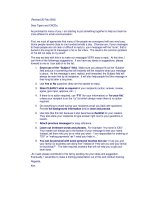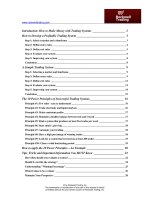Tài liệu How to write great essays part 9 pdf
Bạn đang xem bản rút gọn của tài liệu. Xem và tải ngay bản đầy đủ của tài liệu tại đây (100.11 KB, 10 trang )
Untimed Essay Writing Strategies CHAPTER 6
HOW TO WRITE GREAT ESSAYS
69
JOURNALING
Keeping a journal might seem like an odd advice, unrelated to the major task you have to
accomplish, but it is actually a great way to begin your essay, for two important reasons.
First, your journal will sound like you, written in an authentic voice that should need very
few adjustments when applied to the essay. Rachel Klein, a college counselor at Milton Acad-
emy in Milton, Massachusetts, advises her students to keep journals to help with essay writ-
ing because journals “give them back their own words.” Journals, Klein says, are like “your
mind coming out on paper.” When you are writing your essay, you can use the journal as a
reference for tone and word choices that convey your authentic voice.
The second reason for keeping a journal is that, as written with the journal prompts pro-
vided on page 70, it can be a great source of ideas. In your journal, you can write about what
is important to you, your goals and aspirations, your values, and your take on everything
from popular culture to current events. Coupled with the information you gather in your
personal inventory, a journal is the perfect raw data from which to begin the essay writing
process.
Journaling doesn’t have to be elaborate, or time consuming. Take a minimum of five min-
utes a day to write or type something personal. To journal successfully, it must become a
habit. In order to do that, you need to make the process as simple and painless as possible.
Think about your habits, and which of the two journaling options best suits them. You can
write in a book you have designated as your journal, or you can make journal entries on
your computer, either in word processing documents, or in one of the many new online
journal sites.
If you are writing, get a journal that is small enough to carry with you everywhere you
go. When inspiration hits, you will be ready. Can’t get started? Pick a time and place to write
in your journal each day. If you are typing, set aside a specific time to journal. Open your
journal document before going online to avoid distractions. Stick with it for the allotted
time period.
If you are considering an online journal, visit www.blogger.com and/or www.livejour-
nal.com to see how they are set up. Some sites require you to type entries while online, and
others have downloadable diaries that may be added to at any time. A potential problem
with these types of sites is the distractions. There are other diarist’s entries to read, software
to play around with, and features such as uploading pictures that can keep you from your
real task. If you can’t get right down to work, choose a handwritten or simple word pro-
cessing journal.
Consider trying some of the following prompts to shake up an existing journal, or to
get you started on a new one. If you are new to journaling, find some paper, or open a
word processor document, and write about yourself, the world as you see it, a good thing
that happened today, a bad thing that happened today. The subjects are limitless, but
remember to keep it about
you. Use the following prompts to help you if you are stuck,
or want some direction for your writing.
HOW TO WRITE GREAT ESSAYS
CHAPTER 6 Untimed Essay Writing Strategies
70
■
Write a letter to someone who has had a significant influence on you. Use as
many details as possible to
show, rather than tell, why they are so important to
you.
■
Choose a current event and discuss its importance to you. Be as personal as
possible: how has the event changed your thinking? How does it make you
feel? How has it impacted your daily life or your future plans?
■
Describe a risk you took, and what you gained or lost by taking it. Did you
learn something about yourself or the world? Are you a changed person
because you took the risk? Was it worth it?
■
Choose a work of creativity (visual, musical, literary, scientific) that is of
particular importance to you.
How has it influenced you? Describe it in great
detail and remember to keep it personal.
■
Tell about a travel experience that affected you somehow. Recount the expe-
rience as specifically as possible, using the five senses to detail it.
■
Describe a ritual you perform often that has meaning to you. Think small.
Do you meditate while setting the table? Listen to a certain kind of music
while studying or reading? Cook something for yourself when you are stressed
out? Don’t worry if the ritual is quirky, or if it won’t seem important to some-
one else.
■
Imagine a perfect world. What does perfect mean to you? Get as detailed as
possible. Aside from the requisite world peace and clean environment, think
about the day-to-day things that would make a difference to you. Would every
coffee maker have a “pause and serve” feature? Would your favorite band per-
form free concerts at your school every Saturday? Would everyone in your
state, upon getting their driver’s license, be given the car of their choice?
Once you begin the essay writing stage, your journal will become an invaluable tool. It
can help you to use the right tone, neither too casual nor too formal, so that your essay sounds
like you. While rereading it, make note of the words you use and what your voice sounds
like when you write. Also, make note of the ideas and topics that hold your interest. Some-
times we are not aware of our feelings about something until we take the time to explore
them. Use your journal entries to search for possible essay material.
PERSONAL INVENTORY
The personal inventory in this section is designed to help you mine your life for raw mate-
rial that you can use in your essay. Although you won’t use all, or even most, of the infor-
mation you gather, be willing to explore many possibilities before narrowing down your
essay topic.
70
Untimed Essay Writing Strategies CHAPTER 6
HOW TO WRITE GREAT ESSAYS
71
KEEP IN MIND . . .
Although you should include as much information as possible in a college admissions
essay, keep in mind a number of important qualities that readers are looking for. The
qualities you will be rated in include:
creative, original thoughts academic achievement
motivation written expression of ideas
self confidence disciplined work habits
independence, initiative potential for growth
intellectual ability
What activities and experiences can you write about that highlight one or more of these?
How can you show (rather than tell) in your essay that you have these qualities? Keep
them in mind when filling out your inventory.
To complete the personal inventory, you will need six sheets of paper, one for each of the
following sections. List anything and everything that comes to mind for each section, leav-
ing a few lines between each entry (so you can fill them out with details later).
1.
History
Think back to your earliest memory, and go from there. Move chronologically, cat-
aloguing events in your life, until you reach the most recent one(s). Don’t limit your-
self to dramatic or life-altering experiences. Spend the most time on the past few
years, unless you already know you will write about an event from your childhood.
2.
Achievements and Accomplishments
List all awards or other commendations you have received (academic, extra-cur-
ricular, etc.). Include goals you have reached or accomplished, that may not have
been recognized by others. What has been important to you and your personal
growth? What achievements are you most proud of?
3.
Activities
Outside the classroom, what have you spent your time doing? These may be one-
time or on-going activities. Keep in mind, but don’t limit yourself to: sports, civic
groups, travel, volunteer work, art projects, technology, or religious groups. Why
did you start the activity, and, if applicable, why do you continue with it? Remem-
ber, many of these are listed in other places on your application. Think about things
you have done that are not mentioned elsewhere, or not given significant attention,
on the rest of the application. Here is where you can expand.
4.
Influences
Make a list of the people, events, works of art, literature, and music that have affected
you.
HOW TO WRITE GREAT ESSAYS
CHAPTER 6 Untimed Essay Writing Strategies
72
5. Skills
What are you good at? You may want to ask friends and family members to help
with this. Skills may be those acquired through learning and practice, such as play-
ing an instrument, or personal attributes, such as leadership, or willingness to fol-
low the “road not taken.”
6. Passions
What makes your blood boil or your heart beat faster? Is there a sports team you
follow with fervor, a book you have read ten times, a topic of local, national, or global
importance that gets you riled up? You may have listed these in other sections above;
repeat them here because this category examines them from a different point of view.
U
NDERSTANDING THE
T
OPICS
This section explains seven topics frequently used on college application essays. They include
a free choice topic, which is often used for exit essays. The first five come from the Com-
mon Application, which is currently accepted by over two hundred colleges and universi-
ties. Schools that have their own applications often use these same topics as well.
1.
Evaluate a significant experience, achievement, risk you have taken, or ethical
dilemma you have faced, and its impact on you.
The last phrase is critical: whatever you choose to write about (the “cause”), you
must show its impact upon you (the “effect”). Your experience need not be earth-
shattering; remember that small and seemingly insignificant can be better. You are
guaranteed to write an original essay if you focus on something that you alone expe-
rienced or find significance in.
Writing an essay on what it felt like to drive a car alone for the first time, for
instance, or why you enjoy preparing a favorite recipe, can show your creativity and
your willingness to see the big picture. Perhaps the cooking experience showed you
how a bunch of little steps add up to something big, or how a series of words on
paper can connect you with your ethnic heritage. In other words, readers don’t want
to know about how you took first prize in the Mozart Piano Competition. If you
want to write about piano playing, you could briefly mention the prize, but be sure
to explain how the rigors of practice, the wisdom of your teacher, and the knowl-
edge of musical composition have changed you for the better.
2.
Discuss some issue of personal, local, national, or international concern and its
importance to you.
Many experts caution against writing on this topic unless the issue has had a profound
and highly personal effect on you. It lends itself to clichés (“why I want world peace”)
and can steer you away from your task, which is to reveal something about yourself.
72
Untimed Essay Writing Strategies CHAPTER 6
HOW TO WRITE GREAT ESSAYS
73
Another potential problem with this topic is that you can alienate yourself from
your reader.You don’t know if your essay will be read by a 20-something, a 70-some-
thing, democrat or republican, male or female. Be careful not to dismiss or harshly
critique the other side of your argument while presenting your own.
Since this topic is not among the most popular, you may stand out simply by
choosing it. Just avoid the potential problems, and display your knowledge of the
issue, while keeping the focus highly personal.
3.
Indicate a person who has had a significant influence on you, and describe that
influence.
Be wary of choosing a famous person as an influence. The admissions officers have
read many essays about Martin Luther King, Jr., Mother Theresa, and Charles Lind-
bergh. If you write about a famous person, you need to get highly creative in your
explanation of
how he or she influenced you.
Successful essays on this topic typically center on someone known personally to
the writer (although be aware that parents are favorites with many essay writers,
meaning again that you will need to be highly creative in order to write a unique
essay). No matter whom you write about, remember that the question is a catalyst
for revealing information about you, not about your role model. Do not simply
describe the person. Show evidence of yourself throughout your essay by relating
everything back to you.
4.
Describe a character in fiction, a historical figure, or a creative work (as in art,
music, science, etc.) that has had an influence on you.
As with number three above, you need to keep the focus on you, not the character
or creative work. Your choice of topic does reveal something about you, but you
need to reveal even more by showing how she/he/it has influenced you. This is not
one of the most popular topics, so you will have a good chance of standing out just
by choosing it. Just be certain to keep it personal.
5.
Topic of your choice.
This question is found on dozens of applications (other than the Common Applica-
tion) in many different forms. Massachusetts Institute of Technology (MIT) asks “We
want to get to know you as a person. Make up a question that is personally relevant
to you, state it clearly, and answer it. Feel free to use your imagination, recognizing
that those who read it will not mind being entertained.” Seton Hall University puts
it this way:“The application lists several topic suggestions, but feel free to write about
any subject that you feel is relevant and will enable us to get to know you.”
As with the request for a writing sample below, this topic lends itself to essay “recy-
cling.” If you already have a well-written, vivid piece on something of great signif-
icance to you, something you know well, and that has changed or greatly impacted
upon you, you may use it here.









